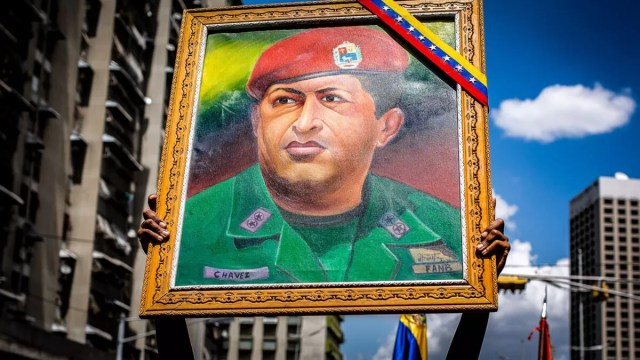
A new book vividly portrays human beings coping with daily existence in a disintegrating society but offers an incoherent analysis of what went wrong.
By Reason – Jim Epstein
Jun 5, 2022
The Bolivarian Cable Train was an elevated railroad planned for a poor neighborhood in Caracas, Venezuela. It ended up running for only three-fifths of a mile and connecting to nothing.
By 2012, four years into the project, the government had spent about $440 million on it and the project was only partly finished. But the country’s socialist leader, Hugo Chávez, decided that he wanted to take a ride on live television. The contractors told his handlers the train wasn’t ready yet; the cable, motors, and machinery had not even been installed.
“No European engineer is going to tell the people of Venezuela what can or cannot be done,” Chávez’s lackey replied. So the government paid an extra million dollars for a temporary setup that might fool the TV audience. An ebullient Chávez (seemingly oblivious that the fragile, makeshift operation nearly sent him hurtling down the track during the broadcast) boasted that “this is the work of a socialist government so that the people will live better every day.”
Today the train runs intermittently, the Brazilian company overseeing its construction has pleaded guilty to corruption in 12 countries, Chávez has died from cancer, and Venezuela, after more than two decades under the control of Chávez and his successor, Nicolás Maduro, has been transformed from a constitutional democracy into a brutal dictatorship. The whole cable train saga is vividly recounted in Things Are Never So Bad That They Can’t Get Worse, a new book by former New York Times reporter William Neuman.
The book gives voice to a woman named Hilda Solórzano, providing a snapshot of what life is like for the Venezuelan poor. Her son’s teeth turned black and fell out from lack of calcium. Her uncle and brother were murdered. Her 10-year-old daughter was kidnapped, tortured, killed, and tossed in a garbage dump. After Solórzano started a successful baking business, a relative stole the money she needed for ingredients. She lives in the same Caracas slum where the government spent around half a billion dollars on the Bolivarian Cable Train.
Neuman also introduces us to bookstore manager José Chacón, the “Last Chavista,” who can’t afford the mayonnaise, beef, and tomatoes he once loved. He skips meals and drops 15 pounds. But Chacón is unswayed. He reveres Chávez and is grateful that the socialist state taught him “to eat healthier.” Someday, after everyone has fled the country, Neuman writes, “you’ll see Chacón, sitting atop the great pile of rubble and ash, holding firm, chewing on the last lentil.”
These are powerful depictions of human beings coping with daily existence in a disintegrating society. But when it comes to explaining why this oil-rich nation experienced one of the largest economic contractions in modern world history, the book is a muddle.
Neuman won’t accept Chávez’s word that he was a socialist. Although the Venezuelan leader used that word relentlessly to describe his policies after 2005, Neuman insists it was just a marketing ploy. “Chávez was neither a Marxist nor in any real sense, despite the rhetoric, a socialist,” he writes. It was “showcialismo.”
Was it? One classic definition of socialism is government control of the means of production. Chávez nationalized banks, oil companies, telecommunications, millions of acres of farmland, ??supermarkets, stores, the cement industry, a glass container maker, a gold-mining outfit, the steel industry, a fertilizer company, a shipping company, the electricity industry, vacation homes, and more. He imposed capital controls that put the government in charge of all foreign trade, turning Venezuela into a command-and-control economy—aside from its burgeoning black market, another typical feature of socialist societies.
In industry after industry, nationalization led to deterioration, abandonment, and collapse. In 2008, Chávez boasted that he would transform the steel giant Sidor into a “socialist company owned by the socialist state and the socialist workers.” By 2019, at the Sidor plant in Guayana City, “everything was stained with rust,” Neuman writes. “In all that great expanse, nothing moved.” The book is filled with similar accounts.
So it was dumbfounding to read on page 82 that “Chávez made no serious effort to dismantle the market economy.” The book claims he was merely continuing longstanding Venezuelan policies but painting them “a different color.” Neuman is a journalist who tells powerful stories and then misinterprets his own material.
Chávez was not the first Venezuelan president to nationalize companies, fix the exchange rate, or impose price controls. But he pursued these policies on a much larger scale than his predecessors. Chávez also gutted property rights, destroyed the currency, dismantled the judiciary, corrupted the military, and undermined the separation of powers. One lesson of his reign is that when it comes to building sustainable prosperity, institutions matter more than possessing the world’s largest oil reserves.
…
Read More: Reason – Former New York Times Reporter Denies in New Book That Hugo Chávez Was a Socialist
…

